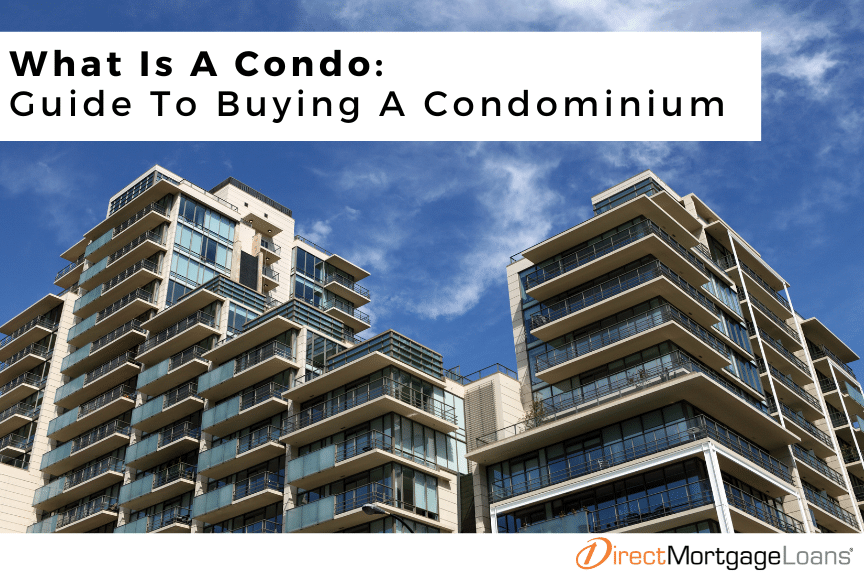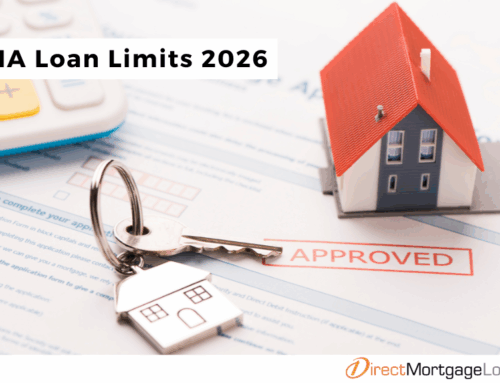Before diving into the specifics of buying and financing a condo, it helps to first understand what a condo is and how condos compare to other housing options. Whether you’re a first-time buyer, downsizing, or simply exploring your homeownership options, learning the basics can help you make a confident decision.
What is a condo?
A condominium, or condo for short, is a type of property where you own your individual unit within a larger residential complex. You have full ownership of your unit, similar to an apartment. However, you share ownership of the building’s common areas with other condo owners. These areas include hallways, amenities, and exterior spaces. This setup combines the benefits of homeownership with less responsibility for property maintenance, which is typically handled by a Homeowners Association (HOA).
Condos could be a great fit for those seeking a more affordable entry into homeownership, or anyone looking to downsize without sacrificing comfort or convenience.
Condo vs. House
Choosing between a condo and a traditional house is one of the decisions you’ll make when buying a home. Each housing option offers unique advantages depending on your lifestyle, budget, and long-term goals. When deciding between a condo and a house, weigh the key differences:
- Maintenance: Condo owners typically pay HOA fees which typically cover maintenance for shared spaces. Each HOA is different, so it’s important to fully understand what is included in the HOA fee of the property you’re considering. While condo buyers benefit from having exterior upkeep handled for them, homeowners of single-family houses are fully responsible for maintaining both the inside and outside of their property—including the yard, roof, and structural elements. This key difference could significantly impact how much time and money you’ll spend on upkeep, depending on which type of property you choose.
- Space: Single-family homes generally offer more square footage, additional bedrooms, and private outdoor space such as backyards or patios, making them ideal for families or those who prioritize room to spread out. In contrast, condos are typically smaller in size, which can mean less space for storage and personal use. However, what condos lack in personal space, they often make up for in shared amenities like swimming pools, fitness centers, or clubhouses—offering a different type of value and convenience that appeals to many buyers, especially those who want a more maintenance-free or community-oriented lifestyle.
- Cost: Condos may have lower purchase prices and require smaller down payments compared to single-family homes, making them a more accessible option for many buyers. However, it’s important to factor in monthly HOA fees, which can vary widely and add a significant amount to your total monthly housing expenses. On the other hand, while single-family homes often come with higher initial costs, they typically don’t involve recurring HOA dues—though you may still face higher maintenance costs over time. Evaluating both short-term affordability and long-term financial responsibilities is key when comparing the two.
- Lifestyle: If you prefer a low-maintenance lifestyle with community amenities, a condo might be ideal. For more privacy and control over your property, a house might suit you better.
Ultimately, the best choice depends on your financial goals, lifestyle, and long-term plans.
How does buying a condo work?
While the condo buying process shares many similarities with purchasing a single-family home – such as securing financing, working with a real estate agent, and conducting inspections – acquiring a condominium involves several distinct steps, particularly concerning the Homeowners Association (HOA). These unique elements often revolve around the shared nature of the property and the collective governance of the community. While the condo buying process shares many similarities with buying a single-family home, purchasing a condo has a few unique steps—especially regarding HOA involvement and property approval. Here’s what you can expect along the way:
Purchasing a condo is similar to buying any other type of home, but there are a few added steps:
- Find a Lender and Get Pre-Approved: The first step in your condo buying journey is to connect with a knowledgeable and approved lender, such as Direct Mortgage Loans. Getting pre-approved not only helps you understand how much home you can afford, but it also shows sellers that you’re a serious and qualified buyer. Direct Mortgage Loans has extensive experience with condo financing and can guide you through any extra steps needed for condo project approval. During this step, your lender will review your credit, income, and financial history to determine your eligibility and provide a preapproval letter to use when making offers—setting you up for success right from the start.
- Work With a Real Estate Agent: Choose an agent familiar with condo sales and HOA structures.
- Find a Condo That Meets Your Needs: Evaluate units, location, amenities, and HOA rules.
- Review the HOA Documents: Before making an offer, carefully review HOA bylaws, financials, and any restrictions.
- Make an Offer and Apply for a Loan: Once your offer is accepted, your lender will guide you through securing financing.
- Home Inspection and Appraisal: A thorough inspection ensures your unit is in good shape, and an appraisal confirms the property’s value.
- Close on Your Condo: After your loan has been fully underwritten and all final approvals are in place, you’ll attend the closing meeting to sign the necessary legal and financial documents. This is when you’ll officially take ownership of your new condo. Once everything is finalized, you’ll receive the keys and can begin settling into your new home. It’s the last step of the buying journey—and the first step of your new chapter as a condo owner.
Different Types of Loans For Condominiums
Financing a condo involves choosing the right loan type for your financial situation and the property itself. Some condos have specific eligibility requirements depending on the loan you choose, so working with an experienced condo lender, like Direct Mortgage Loans, could help you find the best fit. Here are the most common types of loans available for condo buyers:
FHA Loan
FHA loans are government-backed mortgages that are especially well-suited for first-time homebuyers and individuals with lower credit scores or limited savings. They are insured by the Federal Housing Administration and offer low down payment options—as little as 3.5%—making them an accessible financing choice. However, when it comes to purchasing a condominium, not all properties qualify. The condo development must be listed on the FHA-approved list, which ensures it meets certain safety and financial standards. Working with an experienced lender like Direct Mortgage Loans can help you determine if your desired condo is eligible and streamline the application process for an FHA loan. With flexible requirements and down payments, FHA loans are a popular option for first-time buyers.
Conventional Loan
Conventional loans are a popular and widely used option for financing condominiums. These loans are not backed by the government. This means they typically require a higher credit score and a larger down payment, usually starting at 5% or more, compared to government-backed loans like FHA. However, conventional loans often provide greater flexibility in terms of condo project approval. They also have fewer restrictions on the type of properties that qualify. Borrowers who meet the credit and income requirements may avoid paying private mortgage insurance (PMI) once they reach a certain equity threshold. Working with a knowledgeable lender like Direct Mortgage Loans could help you determine if a conventional loan is the right fit for your condo purchase. They can guide you through any added steps required by your lender or the condo association.
USDA Loan
If you’re purchasing a condo in a USDA-eligible rural area, a USDA loan might be an excellent option to consider. These government-backed loans are designed to support homebuyers in rural and some suburban communities by offering 100% financing with no down payment required. However, USDA loans have strict property and income eligibility requirements. For condos specifically, the property must be located in a USDA-approved area and meet the agency’s criteria for safety, habitability, and financial soundness. Because not all condo developments qualify, it’s important to work closely with an experienced lender like Direct Mortgage Loans. Their team can help confirm whether a condo meets USDA standards and guide you through the approval process to ensure a smooth and successful closing.
VA Loan
Eligible veterans, active-duty service members, and surviving spouses can take advantage of VA loans to purchase a condominium. These loans are backed by the U.S. Department of Veterans Affairs and come with powerful benefits, including no required down payment and no private mortgage insurance (PMI). However, the condo project must be on the VA-approved list to ensure it meets safety, financial, and operational standards. Because the approval process for condos can be more complex, it’s essential to work with an experienced and VA-approved lender like Direct Mortgage Loans. Their team can help you navigate the VA loan process and ensure the condo you’re considering qualifies. This makes your path to homeownership smoother and more efficient. Veterans, service members, and surviving spouses can use VA loans to purchase condos.
Homebuying Programs to Help You Purchase a Condominium
In addition to traditional loan options, several specialized programs are designed to make buying a condo more affordable and accessible. These programs are especially beneficial for first-time homebuyers. They also benefit individuals working in essential professions, such as law enforcement, education, and healthcare. By reducing or even eliminating the need for a down payment, they help with closing costs. They also offer tailored financial assistance. These programs could open the door to homeownership for more people. Whether you’re just starting your journey or looking for support in a competitive market, these options can provide a valuable boost when purchasing a condominium.
Go Direct FHA 100% DPA
The FHA 100% Down Payment Assistance (DPA) program offers eligible borrowers complete financing, meaning you won’t need to bring a down payment to the table. This is especially beneficial for buyers who qualify for FHA loans but may not have the cash saved for upfront costs like the down payment and closing fees. This program could be helpful for first-time buyers looking for an affordable path into homeownership.
Direct Mortgage Loans Law Enforcement Home Buying Program
This program is designed specifically to support law enforcement professionals and their families on the path to homeownership. Through the Direct Mortgage Loans Law Enforcement Home Buying Program, eligible members of the Fraternal Order of Police (FOP) and other law enforcement agencies can access exclusive financial benefits, including reduced closing costs and tailored mortgage guidance. The program also offers a streamlined experience with personalized support, ensuring that officers and their families can confidently navigate the homebuying process—whether purchasing a condo or another type of property.
Upon closing, law enforcement members and their family or friends can choose one of the following perks to assist with their home financing needs: a $500 closing cost credit, a $500 gift card, or the first year’s payment of a home warranty through DML’s partnership with Liberty Home Guard. Additionally, Direct Mortgage Loans will make a $100 donation in the FOP member’s name to the FOP Foundation to support their charitable causes.
With this initiative, Direct Mortgage Loans is proud to give back to those who protect and serve by making homeownership more achievable.
Pros And Cons of Purchasing A Condo
Before making a final decision to purchase or not to purchase a condo, it’s important to evaluate both the benefits and potential drawbacks of condo ownership. Depending on your priorities, a condo might offer the perfect blend of convenience and value—or it might come with considerations that don’t align with your goals:
Pros of Condos
- Affordability: Condos are typically more budget-friendly than single-family homes due to their smaller size and shared property structures, which reduce both construction and maintenance costs. This makes them especially appealing to first-time buyers who are entering the market with limited savings, or individuals looking to downsize into a more manageable living space. In many cases, the overall monthly payment for a condo, even when factoring in HOA fees, can still be lower than that of a similarly located single-family home. This cost-effectiveness opens the door to homeownership for a broader range of buyers.
- Low Maintenance: With maintenance responsibilities handled by the HOA, you won’t have to worry about landscaping, exterior repairs, or snow removal.
- Amenities: Many condo communities offer perks like swimming pools, fitness centers, clubhouses, and security features that add value to your living experience.
- Location: Condos are often strategically located in vibrant urban centers or highly sought-after neighborhoods, offering residents easy access to shopping, dining, entertainment, and public transportation. This central positioning can make day-to-day life more convenient. It is especially beneficial for those who prefer to walk or commute using transit rather than relying on a car. In contrast, single-family homes are often found in more suburban or rural areas. These locations may provide more space and privacy but can also mean longer commutes and fewer nearby amenities. If being close to the action is a priority, a condo could be the better fit for your lifestyle.
Cons of Condos
- Rules and Restrictions: Homeowners Associations may enforce strict rules on things like pet ownership, rental policies, and unit modifications. These rules are designed to maintain order and consistency across the community. However, they can limit your personal freedom as a homeowner. For instance, you might face restrictions on the type or number of pets you can have. You could also be limited in your ability to rent out your unit or even in the colors you can paint your front door. In contrast, single-family homeowners generally have far more autonomy when it comes to making decisions about their property. This gives them greater flexibility to tailor their space to their needs and preferences.
- Shared Walls: Living in close proximity to neighbors means less privacy and potential noise from adjacent units.
- Resale Value: While many condos hold their value well over time, their appreciation rate can sometimes lag that of single-family homes. This is often due to factors such as HOA restrictions, limited buyer pools, or competition within large condo developments. Single-family homes, on the other hand, tend to offer greater long-term equity growth thanks to land ownership. They also have fewer shared limitations. If future resale value and equity growth are important to your financial goals, it’s worth weighing these potential differences carefully. Consider these factors before choosing between a condo and a house.
How To Get A Condo Mortgage Loan
Once you’ve decided that a condo is right for you, the next step is figuring out how to get a condo mortgage loan. The next step is figuring out how to get a condo mortgage loan. Securing a mortgage loan for a condo involves a few extra steps compared to a traditional home loan. This is particularly true when it comes to condo project approval. Here’s how to move forward with confidence:
- Check Your Credit and Budget: Review your credit score and overall financial health to understand what type of loan you may qualify for and how much you can afford.
- Choose a Lender Who Understands Condo Financing: Partner with a lender like Direct Mortgage Loans that has experience working with condo developments and understands the additional approval requirements.
- Get Pre-Approved: Submit your financial documents to your lender to receive a preapproval letter, which shows sellers you’re a serious buyer and helps narrow down your condo search. Working with Direct Mortgage Loans to get pre-approved will allow you to understand each step of the process more clearly. Talk to a loan officer to find out more information.
- Find an Approved Condo: Work with your lender and real estate agent to ensure the condo development is eligible for your loan type, whether it’s FHA, VA, USDA, or conventional. Direct Mortgage Loans has a team specifically for condos that is ready to assist you on your homebuying journey in any way you need.
- Submit Your Application: Once you’ve chosen a unit, formally apply for your mortgage and provide all required documentation to start the underwriting process.
- Close and Celebrate: After your loan is approved and the final documents are signed, you’ll officially become a condo owner and can start enjoying your new home.







Leave A Comment
You must be logged in to post a comment.